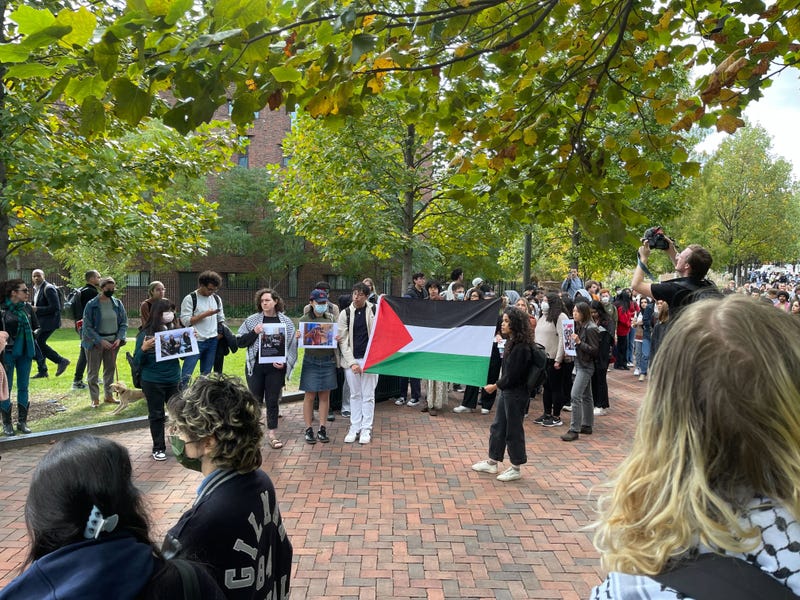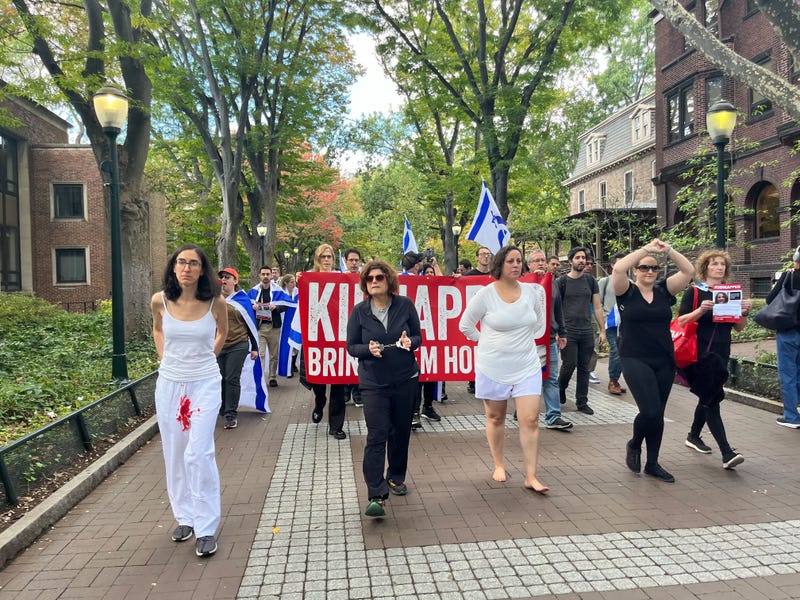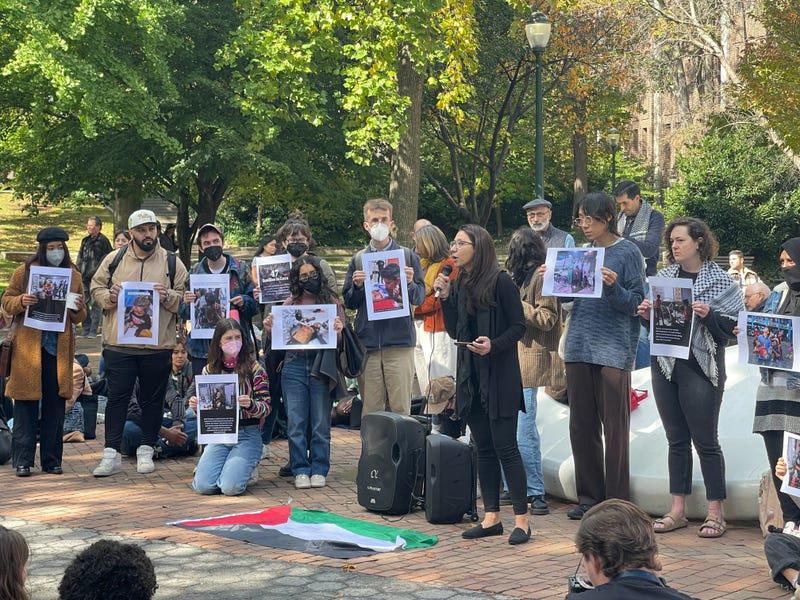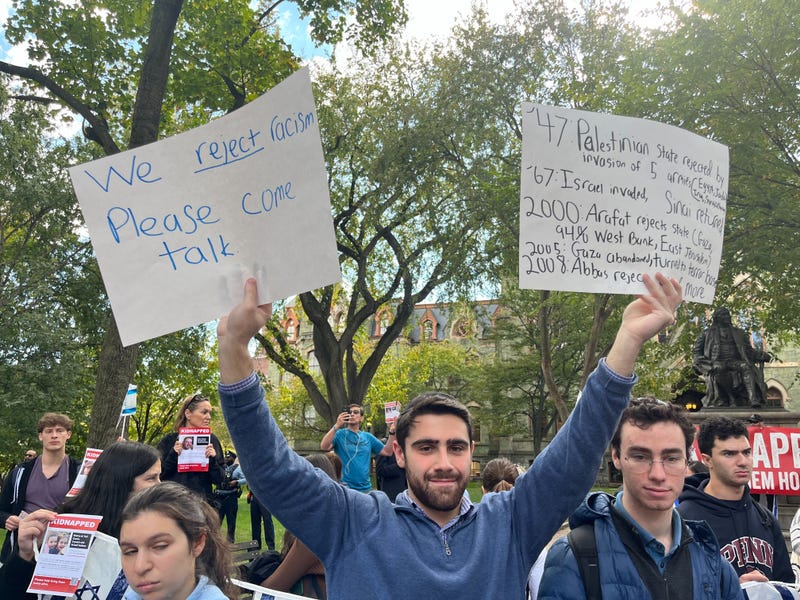
PHILADELPHIA (KYW Newsradio) — Dueling protests of pro-Israeli and pro-Palestinian students converged on the University of Pennsylvania’s campus Wednesday. Both demanded justice for the unraveling situation in the Middle East since Hamas’ terror attack on Israel.
Pro-Israeli protesters called for the release of hostages that Hamas kidnapped, and said they were shocked to hear a call and response among Palestinian supporters: “There is only one solution: Intifada revolution.”
“He just called for Intifada revolution,” said a middle-aged, pro-Israeli woman in distress who approached city police officers. “He just called to people in the crowd to get up and kill the Jews just now. And everybody is reciting it.”
A young man from the pro-Palestinian side, walking by, said to her, “‘Intifada’ literally means insurgency. It has nothing to do with killing anyone.”
“Have you been in Israel during the Intifada?” asked the woman, referring to the protests and violent riots that erupted starting in 1987 by Palestinians frustrated by Israeli control.
“Do I look like I’m old enough?” he said.
Asked what the phrase “one solution” means, another pro-Israeli protester said, “It really calls back to the Holocaust, to me.”
Then, another young man from the pro-Palestinian side said, “I can totally see how someone might misconstrue that as alluding to the ‘Final Solution,’” referring to Nazi Germany’s code name for the mass murder of European Jews.
The interactions underscored the deep mistrust between the different groups, where history and language are subject to wildly different interpretations and fervent debate.
Nada Abuasi, a student at a nearby university and an organizer with the Philly Palestine Coalition, mourned the thousands of lives lost in Gaza amid the humanitarian crisis that has grown since Israel began its retaliation.
“We all collectively came out to stand in mourning, but also to emphasize that, despite everything that has happened, we're not defeated,” she said.
Abuasi called those who have lost their lives in Gaza “martyrs.”


A smaller group of pro-Israeli students had gathered, listening to the Palestinian supporters from the fringes. One student silently held a sign that read, “We reject racism. Please come talk.” Members of the earlier pro-Israel rally were encouraged to stand with them.
The word “martyrs” was a red flag for the pro-Israeli students.
“They said that the purpose was to protest the ‘ethnic cleansing of Palestinians in Gaza’ and ‘to honor our martyrs,’” said Penn freshman Beni Romm.
“The first, I believe, is a libelous statement against the [Israeli Defense Forces]. And the second is a dog whistle towards terrorism — because, although martyr, it is not exclusively referred to terrorists, Hamas and other Palestinian groups often praise terrorists as martyrs.”

The United Nations has sided with the view that there has been “ethnic cleansing” of Palestinians.
“Israel has already carried out mass ethnic cleansing of Palestinians under the fog of war,” Special Rapporteur Francesca Albanese said on Oct. 14 in a report to the U.N. on the post-1967 state of human rights in the Palestinian territory. “Again, in the name of self-defense, Israel is seeking to justify what would amount to ethnic cleansing.”
Israeli Prime Minister Benjamin Netanyahu has accused the world body of “baseless criticism.”
Pro-Palestinian Drexel student Zaid Hussein said his group was also there to denounce the United States as well as Israel. He said he sees Hamas’ brutal attack, which slaughtered innocent Israeli civilians, including women, children and the elderly, as justified retaliation for the Israeli government’s oppression of Palestinian civilians.
Before the current outbreak of war, the human rights group The Global Centre for the Responsibility to Protect says more than 170 Palestinians were killed by Israeli forces in the West Bank and Gaza Strip in 2023.
“Honestly, I don't think resistance is a bad thing,” Hussein said. “This is something that I was not surprised by, and this is something that I'm not upset by as well. Although so many lives have been lost, there's a reason for that.”
Sophomore Noah Gold, a Jewish member of Penn’s student body, summed up a common sentiment.
“I personally feel unsafe, calling for the killing of my people on campus. They wouldn't allow a white nationalist group to come here and spew the killing of another race.”
There were points where, perhaps, both crowds could agree. Penn professor Firoozah Kashani Sabet is Iranian, and she condemned Hamas’ attack on Israel and called for unity to find a peaceful outcome.
“We are all human beings and must do everything that we can to stop the carnage and work towards peace. As the founder of this university, Benjamin Franklin, has said, ‘There was never a good war or a bad peace,’” she said.
“Let us remember those wise words as we implore both sides in this conflict to conclude a political solution.”
